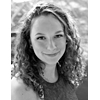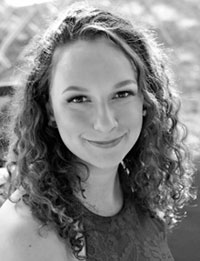AVIVA-Berlin >
Jüdisches Leben > Mia's column
AVIVA-BERLIN.de 4/13/5786 -
Beitrag vom 01.10.2019

A Resolution for the New Year. Reflections on Being Jewish by Mia Szarvas
Mia Szarvas
When youôÇre alone you have to celebrate everything on your own. When youôÇre with a group of people that donôÇt share your traditions, itôÇs easy to let them slip away. But when you stop celebrating your traditions, that were so integral in building your identity, you start to lose a part of ...
... your identity, you lose a part of yourself. For the new year, IôÇm making a resolution hold onto my Jewish identity, to hold onto my sense of self, even if it means celebrating alone.
Back home, in California, I felt held in my larger community, as a Jewish person, because even people who were not Jewish, were aware of my Jewish traditions. Around Rosh Hashana, the "head of the year", the Jewish New Year, it is traditional to say "Shana Tova", happy new year. My non-Jewish friends knew, even if that is all they knew, that the holiday was coming, and to greet me with this phrase. Just acknowledging that it was a special time for me, made me feel seen, supported, and like I belonged. It helped me integrate my Jewish identity in with my other identities, the ones I shared with my friends who werenôÇt Jewish. It helped me feel like my friends saw and loved the whole of me. It made me feel like we shared this tradition, even if just slightly. It allowed me to feel part of the whole, with a special access to something extra, rather than othered from the rest of the group.
When almost no-one in your community knows about your traditions, knows they exist, what they are called, when they are happening, what they mean, or what they may mean to you, it is easy to feel erased. It is easy to feel invisible. Identity is not just formed inwardly by yourself but also by what people reflect to you. Most of the Jewish identity reflected back to me in Germany is present or historical antisemitism, instead of all the positive things about being Jewish. My Jewish identity was built over the last 26 years, made of celebration, family, community, and baking bread with friends. It was formed while eating my Polish grandmaôÇs schnitzel and pirogi, dozing off on long flights to Israel to visit my family, and debating talmudic passages during my free time in college. Analyzing torah portions for feminist teachings, giving workshops about consent to middle schoolers at a local synagogue, and screaming with joy as I ran around my college housing cooperative holding hands and singing Hanukah songs with my housemates were ingredients that built the rich identity I call Jewish. Quiet Friday nights with family friends and loud parties filled with the sounds of only voices and no music at the Shomer Shabat coop in college made Shabbat special for me. Feeling a connection to my ancestors when I blessed bread, before I ate it and wine before I drank it, in chorus with my friends and family, grounded me in my life and my Jewishness. Running a Jewish non-profit with a board of my best friends, including non-Jewish ones, and building a Sukkah at my Waldorf school, made me feel that my Jewish traditions did not have to stay in a box, that my Jewish identity could transcend my Jewish community, and include the whole of my life and people that I love. Here in Germany, when all that gets reflected to me is the negative pieces of Jewish history, my Jewish identity becomes that negativity, instead of all the beautiful pieces it was built from. With positive reflections few and far between, and virtually no one to celebrate with me in the ways familiar to me, my Jewish identity takes the backstage, stored away, and almost forgotten.
When I begin to think about the richness it once brought to my life, I quickly push those thoughts away, for fear nostalgia will overcome me. Many ask me why I donôÇt just continue the celebrations on my own. For me, being Jewish was always about community. It is virtually impossible for me to connect to that identity, completely alone. It is possible to explain to my non-Jewish friends what every holiday means, to invite them to celebrate with me, and I have. But the beauty of tradition is that it is shared. Sharing is one of the most significant experiences a human can have. When I have to educate my community down to the very existence of my traditions, it makes me feel other, rather than included. This is not something my friends have done wrong, but it is the reality of it.
Rosh Hashanah is the New Year. It is a time of new beginnings. It also often falls along the autumn equinox, marking the descent into winter, and away from the light. Tonight, we head into the year 5780 of the Jewish calendar. The 5780th time Jews have looked ahead, and looked inward, thinking about what the next year will bring. In my family, it is tradition to make resolutions for the coming year.
This morning, as I rolled out my challah dough, memories of my friends laughing with me as we rolled out the same dough came to mind. As I braided the loaf, in the traditional rounded style for Rosh Hashana, a sense of joy, groundedness, familiarity, me-ness, overwhelmed me. I remembered how important my traditions are to me, how taking part in them, even if alone, can make me feel connected to my Jewish community, can make me feel connected to myself. My resolution for this year is to make myself visible. To make my whole self visible, including the Jewish part, even if the only person IôÇm fully visible to, is me.
About: Mia Szarvas was born in Vermont to an Israeli father and Italian-American mother, raised in California, and currently lives in Bremen, Germany. Her grandmother, Marta, escaped from Poland in August of 1939 with her parents and sister, with whom she set up a new life in Palestine, while the family they left behind perished in the Holocaust. Mia has a degree in Political Ecology from the University of California, Berkeley, and works in tech to create empowerment in unexpected places. She is curious about multiculturalism, languages, feminism, and how our intertwined histories inform the present.
Follow MiaôÇs art project "Humans Who Inspire" on Instagram @humanswhoinspire. Mia draws portraits of humans who inspire her as a meditation on the multitude of incredible humans working to make the world a better place. She also accepts requests and submissions.
Read more by Mia Szarvas at AVIVA-Berlin:
"Uncovering Jewish Venice." Reflections on Being Jewish by Mia Szarvas
"LetôÇs Get Uncomfortable ãÎ." Reflections on Being Jewish in Germany by Mia Szarvas
"I Answered All Your Question About Jews, so You DonôÇt Have To (And so I DonôÇt Have To)" - reflections by Mia Szarvas
"I DonôÇt Want Your Shame" - reflections by Mia Szarvas
Yom HaShoah - reflections by Mia Szarvas

Photo of Mia Szarvas by Elena Sloman